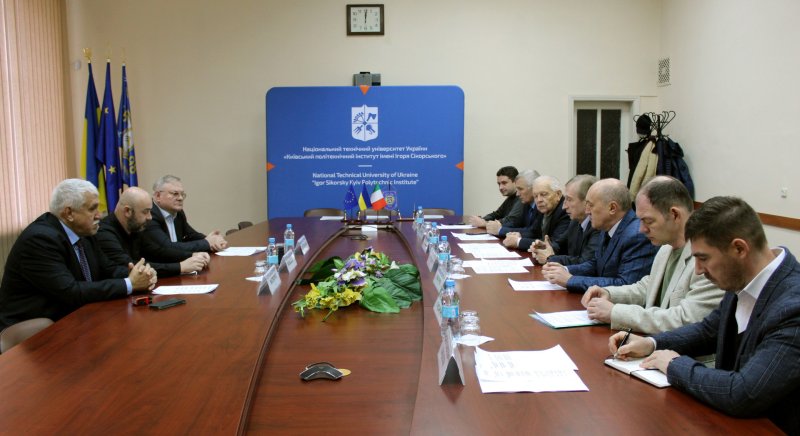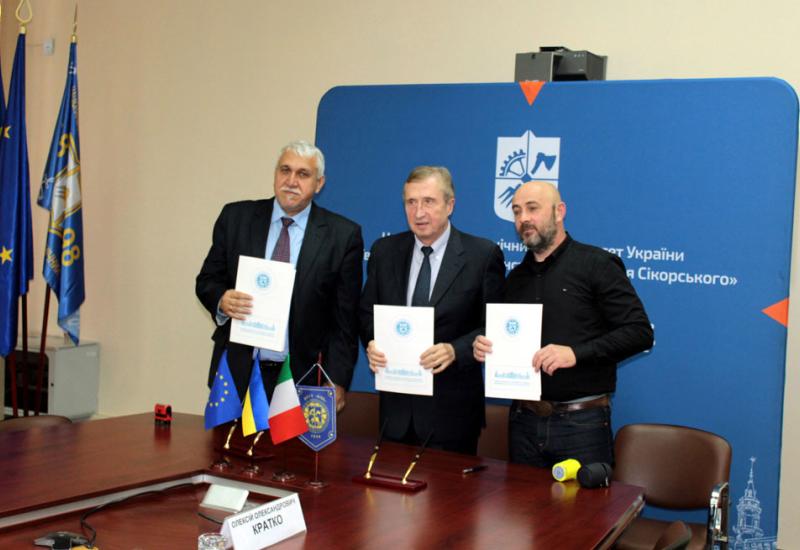Creating a model of the Earth's gravitational field based on real-time data from a group of satellites equipped with ultra-sensitive gravimeters is no longer a fantasy. In any case, it is now clear how this can be done. So the only question is how to put this idea into practice. And we can hope that this will be done in the coming years. The key is a project that will be jointly implemented by Igor Sikorsky Kyiv Polytechnic Institute, SRL Gravisat (Italy), and Sinko Research and Production Enterprise LLC. The memorandum of cooperation in this area was signed on November 16 by the rector of the university, academician of the National Academy of Sciences of Ukraine Mykhailo Zgurovsky, director of SRL Gravisat Serhiy Matvienko and director of Sinko Sergiy Malyovanyi.
Tracking changes in the gravitational field in real time, or rather, recording its anomalies based on changes in the free fall acceleration in different parts of the world, can be used to predict seismic activity. According to scientists, changes in g may be its harbingers, and more reliable than those currently used in geophysics to predict earthquakes. Also, information about deviations of the free fall acceleration from the standard values for a certain latitude can be used in mineral prospecting and for other purposes.
"We have organized a joint structure for the creation of the Gravysat space system, where Igor Sikorsky Kyiv Polytechnic Institute is responsible for the creation of the space platform, Sinko is responsible for its payload, i.e. the gravimeter, and its main customer is Gravysat," said Sergiy Matvienko. - "During our ground tests, we saw that seismic activity associated with the movement of tectonic plates leads to changes in the value of free fall acceleration... and with the help of a specially designed gravimeter, we can record this. Our statistics show that such changes occur the day before an earthquake, so we believe we can solve this global problem (earthquake forecasting - author), which has not yet been solved in the world." According to him, in order to monitor the state of the gravitational field of the entire Earth, it is necessary to use not just one Cubesat satellite, but a global system of 18 nanosatellites that will be able not only to measure the acceleration of free fall in different parts of our planet, but also to transmit this information in real time to users. Of course, Igor Sikorsky Kyiv Polytechnic Institute as one of its developers will have free access to it.
Before signing the document, the project participants discussed a number of organizational and technical issues of its implementation. In particular, they talked about the time frame for preparing the first sample: it is planned to manufacture it and conduct ground tests in less than a year, after which the issue of launching the first vehicle into orbit will be resolved. The university design bureau "Storm" has been designated as the base organization for the project.
"Igor Sikorsky Kyiv Polytechnic Institute has significant experience in creating a platform for measuring and operating scientific equipment in orbit, that is, the satellite and its systems. These are critical systems such as stabilization, navigation, high-speed data transmission, orientation systems, systems for maintaining and providing power for scientific equipment," explained Igor Sikorsky Kyiv Polytechnic Institute Director Oleksiy Kratko, "Igor Sikorsky Kyiv Polytechnic Institute has a very significant potential of specialists in this regard, so, of course, the assembly and adjustment of the engineering model of the satellite and the rest of the satellites of the entire system, as well as their testing, which is very important, can be carried out on our base.

As for the payload, i.e., the gravimeter, a fundamentally new development is proposed here as well. Valentyn Khytrovsky, Advisor to the Director of the Sinko Research and Production Enterprise, is confident that the accuracy of the new sensor will allow it to "catch" the most microscopic deviations in the value of free fall acceleration from its standard value for a given point on the earth's surface.
Therefore, the project is important not only for Ukraine but also for the whole world.
Kyiv Polytechnic, SRL "Gravisat" and Research and Production Enterprise "Sinko" signed a memorandum of understanding.
It is planned to create a space system "Gravisat", which will study the nature of earthquakes.

